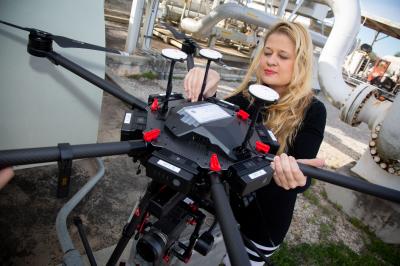DOE NETL funding research of gas leak detection using infrared cameras on drones

Credit: Southwest Research Institute
SAN ANTONIO — May 1, 2019 — A Southwest Research Institute methane leak detection system is taking flight as part of a U.S. Department of Energy (DOE) National Energy Technology Laboratory (NETL) project to develop automated inspections of oil and gas facilities.
SwRI researchers will adapt the Smart Leak Detection System/Methane (SLED/M) technology to detect methane leaks in real time, from aboard a drone. SwRI developed SLED/M with DOE NETL funding. SwRI also developed SLED technology, winner of an R&D 100 Award in 2017, which uses cameras and artificial intelligence to detect liquid hydrocarbon leaks on pipelines and facilities, such as pump stations.
“After successfully developing SLED/M for stationary applications, such as fenceline monitoring of midstream facilities, we are advancing the technology to perform autonomously from drones,” said Maria Araujo, a manager in SwRI’s Critical Systems Department.
The system identifies small methane leaks, or fugitive emissions, by pairing passive optical sensing data with artificial intelligence algorithms. The latest funding will enable SwRI to collect data, test midwave infrared cameras (MWIR) on drone flights and develop machine learning algorithms to detect methane leaks.
“Drones and camera configurations present unique challenges because they capture data at different heights, distances and speeds,” Araujo added. “This funding enables development and testing to adapt the technology for commercial aerial inspections.”
SwRI designed SLED/M to pinpoint the smaller methane leaks that typically go unnoticed along pipelines and storage facilities. Conventional detection systems, designed to locate larger leaks, suffer from false positives and missed detections, which hamper effectiveness and utilization by industry. SLED/M substantially reduces false positives and detects leaks that may go unnoticed by optimizing algorithms to reliably detect leaks under a variety of environmental conditions.
The project will also leverage SwRI’s ongoing research into unmanned aerial systems (UAS), drone automation, navigation, perception and data analytics. SwRI’s recent drone innovations include adapting technology to autonomously inspect damaged nuclear reactors and other hazardous facilities.
“SwRI’s R&D investment in drone payloads and analytics aligns with our mission to advance science and technology that benefits government, industry and humankind,” said Dr. Steve Dellenback, vice president of SwRI’s Intelligent Systems Division. “This effort is helping to address a significant challenge facing the world right now.”
Methane, the main component in natural gas, is considered a more threatening greenhouse gas than carbon dioxide because it absorbs heat more effectively. The World Meteorological Organization recently reported that methane levels are 2.5 times higher than pre-industrial times.
SwRI is addressing methane leaks from multiple disciplines. A team of fluids engineers participated in the Methane Detectors Challenge, developing a solar-powered system to identify fugitive emissions in the gas-producing sector.
SwRI is also pairing satellite data from space with algorithms to identify large methane leaks from midstream facilities and crude oil spills on the ocean surface.
Araujo will speak about this project and autonomous pipeline inspection using computer vision and machine learning at 11 a.m. on May 1 at AUVSI XPONENTIAL, Room S404bc.
Watch a project video here https:/
For more information visit https:/
###
Media Contact
Robert Crowe
[email protected]
Original Source
https:/



